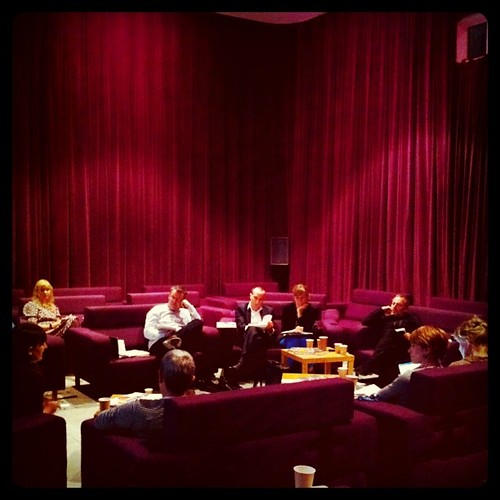Philosophy
Posting an manifesto I was given a week ago at Liverpool. It gives you a nice overview of of challenges societies see regarding the growing digital divide and how to tackle it. This is super important for societies in Europe, and rest of the world as well.
Tackling the Digital Divide
1. Give older people access to enter the digital world - Residential care homes, sheltered accomodation, clubs for the elderly and care centres should be digital hubs - providing mental stimulation and opportnities to explore and learn new creative media skills. Digital technology can help older people get socially connected, with lessons in how to surf, blog, make short films or even DJ.
2. Let's open the doors to the online Town Hall - Community activity is increasingly happening online via forums and websites for the local population. Democratic debate and participation is thriving o the internet. Older people should have greater access to the tools and skills needed to participate in their online neightbourhood.
3. Online Freedom Passes for over 65's - The internet is now the primary source for public service information. From collecting pensionsto legal advice, everything is going digital. To ensure pensioners can make the most of the opportunities available, the Government and Internet Service Providers should provide over 65s with subsidised internet access, and make access to super-fast broadband for the most vulnerable a priority.
4. End digital illiteracy - 10 million people in the UK lacking basc digital skills os a social injustice ans an economic liability. The government should set a target for eliminating digital illiteracy by 2013 and established Government's national youth service where young people "buddy-up" with the elderly online.
5. Social networking across the ages - Conversations between the generations are fundamental to a well-functioning, happy society - and the Internet is the perfect place for those conversations to take place. From webinars which bring older people into the classrooms to online Q&A's, the young and the old should meet in the digital ether - actively promoted by Facebook, Twitter and YouTube.
Monday, June 20, 2011
Thursday, June 16, 2011
Putting Power in the Hands of Citizens in the Digital Age
Business
I am attending and speaking at The Finnish Institute in London organised Community TV Expert Meeting, held at FACT Liverpool. This is a roundtable event trying to promote cooperation and best practises of Community media.

One idea forwarded during the day is to look back at community media of 70s and 80s. Curation and social identity through pirate media stations gained traction in these centuries. So we argue that, putting power in the hands of citizens will be one of the first choice for curators and media.
Community television is a throwback to a time when cable technology was new and the web was not yet born. It allowed anyone to create a program that could be seen on cable. Community television was the youtube of its day; but things have changed. Downloading and streaming have precipitated a complicated restructuring of the television industry, brought on in part by new viewing habits. Traditional TV now seems to be on the wane. But there are some things that are harder for the internet to replace.

Most television takes more than one person to make. The internet cannot replace the studio space, hands-on training and possibilities for in-person collaboration and mentorship that community television allowed for. It won't replace the sense of place provided by a community production studio; a space where people can gather, work, learn and create together.
We are at a critical moment when traditional media ownership is more concentrated than ever, and yet we have perhaps the most participatory medium in history at our fingertips. As such, citizens need access to media literacy, knowledge and media production skills more than ever before. Community media centres--modeled on the idea of recreation centres and local libraries--may be a crucial piece of the digital divide puzzle
Finally an nice overlook of Liverpool from the rooftop of FACT.

I am attending and speaking at The Finnish Institute in London organised Community TV Expert Meeting, held at FACT Liverpool. This is a roundtable event trying to promote cooperation and best practises of Community media.

One idea forwarded during the day is to look back at community media of 70s and 80s. Curation and social identity through pirate media stations gained traction in these centuries. So we argue that, putting power in the hands of citizens will be one of the first choice for curators and media.
Community television is a throwback to a time when cable technology was new and the web was not yet born. It allowed anyone to create a program that could be seen on cable. Community television was the youtube of its day; but things have changed. Downloading and streaming have precipitated a complicated restructuring of the television industry, brought on in part by new viewing habits. Traditional TV now seems to be on the wane. But there are some things that are harder for the internet to replace.

Most television takes more than one person to make. The internet cannot replace the studio space, hands-on training and possibilities for in-person collaboration and mentorship that community television allowed for. It won't replace the sense of place provided by a community production studio; a space where people can gather, work, learn and create together.
We are at a critical moment when traditional media ownership is more concentrated than ever, and yet we have perhaps the most participatory medium in history at our fingertips. As such, citizens need access to media literacy, knowledge and media production skills more than ever before. Community media centres--modeled on the idea of recreation centres and local libraries--may be a crucial piece of the digital divide puzzle
Finally an nice overlook of Liverpool from the rooftop of FACT.

Subscribe to:
Comments (Atom)
